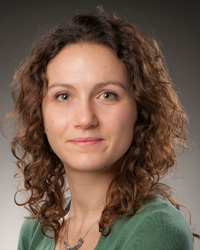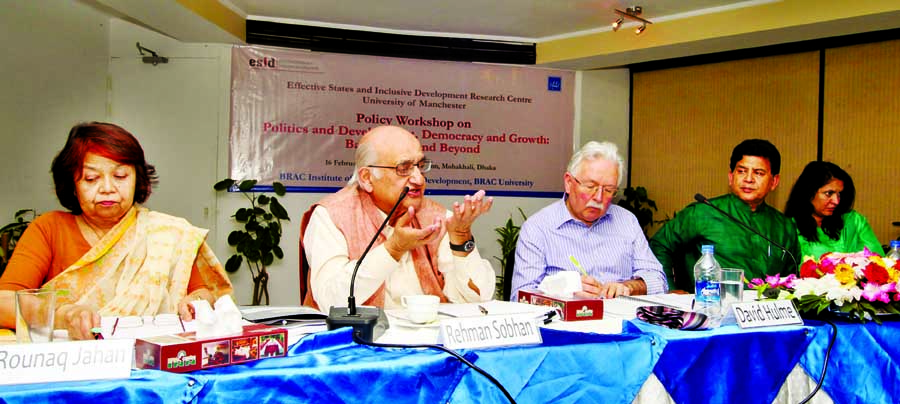Researching the politics of development
Blog

Unpacking the ‘Bangladesh paradox’: the politics of inclusive economic and social development

Dr Mathilde Maitrot
22 February 2017
Global Challenge Research Fund Postdoctoral Fellow, Mathilde Maitrot reports from the ESID and BIGD Policy Workshop in Dhaka
Close to five decades have passed since Bangladesh was allegedly termed a ‘basket case’ by the US Secretary of State Henry Kissinger – (it was actually his aide who coined the term.) In 2017, the country is now more commonly referred to as a ‘paradox’, a ‘development ‘surprise’ or a ‘miracle’. These terms point to an apparent anomaly between the country’s recent success in terms of economic growth and human development/MDG targets compared to the low quality of its political institutions. With Price Waterhouse Cooper’s recent forecasts of the economic and political order in 2050, projecting that Bangladesh will be one of the three leading emerging economies[1] driving global growth, it looks as though, assuming the country’s political dynamics support growth, Bangladesh could become the 23rd largest economy by 2050.[2]
On 16 February 2017 in Dhaka, ESID and our BRAC University partner BIGD organised a one-day policy workshop where members of civil society, academics, private sector representatives and public intellectuals discussed the usefulness of adopting a political settlement framework to shed light on this so-called ‘development paradox’. Our discussion was structured around four key studies on the politics of inclusive development in Bangladesh: economic growth, health and education services delivery and outcomes and domestic violence law.
Bangladesh’s complex political history raises important questions about the relationship between economic growth and development. Post-independence Bangladesh has experienced a wide range of political regimes characterised by varying degrees of legitimacy and political order. A paper by Mirza Hassan and Selim Raihan argued that the nature of the political settlement has changed significantly, having moved from a competitive clientelistic type in 1991 to a dominant party settlement since 2014. Despite the changes and the frequent political turmoil, the economic growth in the country has proven to be resilient at 6 percent per year for 25 years, outperforming most South Asian countries.
This economic achievement is based on the ordered deals between political elites and the business sector. The ordered nature of the deals assures investors that the political elite will deliver on their promises, an arrangement which typically characterises maturing economies. In Bangladesh’s elite political culture, however, most deals rely on personal ties and factional loyalties. Rents are shared amongst such networks in a manner that allows businesses not only to survive episodes of political uncertainties, but to take advantage of emerging opportunities and benefit from steady economic growth.
Are these positive economic trends sufficient to deliver inclusive development? Statistics indicate that Bangladesh’s recent achievements are not limited to the economic sphere. The development story of the country offers many important lessons in reducing poverty, with poverty rates dropping from 44.2 percent in 1991 to 23.2 percent in 2016, and shows impressive trends with regards to health and primary schooling.[3]
In the health sector, Bangladesh made remarkable progress towards MDG4 on child mortality and only narrowly missed achieving MDG5 on maternal mortality. The transformation from a mainly urban-based health care system to a rural system was carried out through unregulated processes of resource allocation and accountability, argues Simeen Mahmud. This change produced inefficiencies in the quality of service delivered and created rent-seeking opportunities for doctors moving from public to private delivery structures. As a result, health care is delivered in a largely uncoordinated and fragmented manner across a wide range of private, public and civil society actors. Perhaps surprisingly, this ‘pluralist’ framework has managed to deliver mother and child health services that have reduced morbidity and mortality rates.
Naomi Hossain’s study on education points to similar trends, emphasising the need to go beyond the pursuit of arbitrary targets and pay more attention to quality. Naomi’s analysis points to a political settlement around the quality of education, based on what she calls a ‘watery consensus’ at the top. The implementation process, particularly the accountability means and processes to hold teachers accountable, is weak. Critically the outcome of the political settlement in the education domain is low-quality primary education, with pupils receiving only between 20 percent and 50 percent of the international average hours of learning per year. Further research is needed to understand the political and practical roles played by private (schools and clinics) and civil society actors in each of these sectors.
Discussions of the political settlement around the gender equality agenda presented some critically paradoxical trends. Looking strictly at numbers, the Bangladesh case shows high levels of female political participation at the ministerial and local government level. The policy momentum in support of female politicians is getting increasing attention from national actors and international development agencies. This trend, mainly driven by quotas, is deceiving. Sohela Nazneen argued that including women is not enough and that the violent nature of Bangladesh politics largely excludes women from mobilising politicians and from building a strong citizen constituency and elite coalition to take the gender and development agenda further in policy terms.
Where do non-elites fit into the political settlement framework? In a context of political uncertainties, both domestically and internationally, some analysts are no less nervous about Bangladesh’s future than they were 30 years ago. Under these circumstances, it is difficult to know whether the elite consensus can be maintained and at what cost for participatory democracy and inclusive development. ‘Would civil society actors like to comment?’ asked the chair. No comments … perhaps reflecting the politically partisan scrutiny that many/most civil society actors are now constrained by.
Our discussion concluded that the identified paradox might be an indicator of the transitional nature of the political settlement in Bangladesh. It sheds light on some of the complex and non-linear relations between processes of ‘modernisation’ and ‘democratisation’ and its outcome in terms of economic growth and development in transitioning economies. But what is Bangladesh transitioning to? Pessimists worry about further unrest and possible violence, as the means through which state and party dominance is being exerted limits the space for citizenry political discussion, both outside and within political parties. Drawing cross-country comparisons with Malaysia, Indonesia and South Korea, the discussants reflected on the political economy of inclusive growth and the use of development as an ‘alibi’ for political parties to maintain a monopolistic power. Optimists, on the other hand, see that the current political settlement can open up opportunities for key socio-economic reforms to take place. They argue that these can result in sustained investments in an educated and healthy workforce that will support Bangladesh’s growing role in the global economy. Certainly, the eroding legitimacy of the current political order makes predictions about the next stage of economic and social development in Bangladesh merely speculative.
Read our briefing paper on Bangladesh research.
[1] Together with Vietnam and India.
[2] Moving from 31st position (in 2016).
[3] Primary school enrolment for girls is higher in Bangladesh than in Bhutan, Nepal and Pakistan, and about the same as in India.
